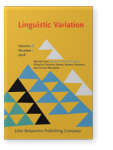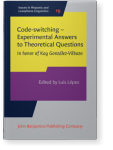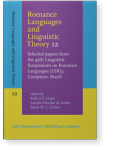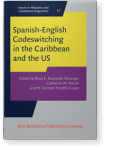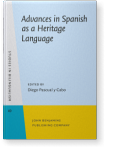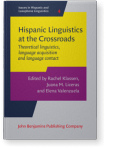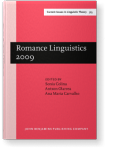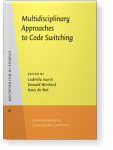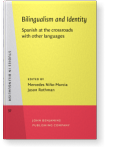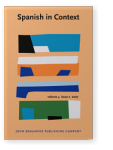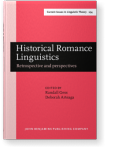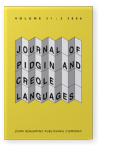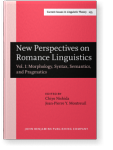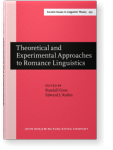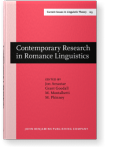Almeida Jacqueline Toribio
List of John Benjamins publications for which Almeida Jacqueline Toribio plays a role.
2018 The challenges and benefits of annotating oral bilingual corpora: The Spanish in Texas Corpus Project Romance Parsed Corpora, Tortora, Christina, Beatrice Santorini and Frances Blanchette (eds.), pp. 100–119 | Article
This article describes efforts to collect, process, and automatically annotate a corpus of Spanish as spoken in Texas. It elaborates the protocols for the development of the corpus and the procedures for automatic annotation, illustrating the common pitfalls to language identification in… read more
2018 The future of code-switching research Code-switching – Experimental Answers to Theoretical Questions: In honor of Kay González-Vilbazo, López, Luis (ed.), pp. 257–267 | Chapter
2017 Chapter 14. Structural approaches to code-switching: Research then and now Romance Languages and Linguistic Theory 12: Selected papers from the 45th Linguistic Symposium on Romance Languages (LSRL), Campinas, Brazil, Lopes, Ruth E.V., Juanito Ornelas de Avelar and Sonia M. L. Cyrino (eds.), pp. 213–234 | Chapter
The present contribution reflects on the competing disciplinary, ideological, and methodological tensions in the study of bilingual code-switching and advocates for a data-driven structural approach to the patterns of language mixing attested across language pairings and Speech communities. More… read more
2016 The stratification of English-language lone-word and multi-word material in Puerto Rican Spanish-language press outlets: A computational approach Spanish-English Codeswitching in the Caribbean and the US, Guzzardo Tamargo, Rosa E., Catherine M. Mazak and M. Carmen Parafita Couto (eds.), pp. 171–189 | Article
This chapter considers the presence of English in a 3.3-million-word corpus of Puerto Rican news press addressed to distinct social classes: El Vocero, published for a working-class population, El Nuevo Día for a mainstream market, and 80grados for an intellectual readership. Statistical models… read more
2016 A new look at heritage Spanish and its speakers Advances in Spanish as a Heritage Language, Pascual y Cabo, Diego (ed.), pp. 27–50 | Article
In this chapter we advocate for the value of new forms of observation for characterizing the Spanish of heritage speakers in the United States. As is widely recognized, Spanish acquired in bilingual contexts is different from Spanish acquired in monolingual settings; and, yet, the nature of… read more
2015 An experimental approach to hypercorrection in Dominican Spanish Hispanic Linguistics at the Crossroads: Theoretical linguistics, language acquisition and language contact, Klassen, Rachel, Juana M. Liceras and Elena Valenzuela (eds.), pp. 251–268 | Article
A stigmatized trait of popular Dominican Spanish is the insertion of pre-consonantal or final [s] into a lexical item (e.g. Ja[s]queline). The predominant explanation among phonologists for this uniquely Dominican phenomenon is that the uneducated are ‘lost-s’ speakers who do not know which words… read more
2010 Correcting the record on Dominican [s]-hypercorrection Romance Linguistics 2009: Selected papers from the 39th Linguistic Symposium on Romance Languages (LSRL), Tucson, Arizona, March 2009, Colina, Sonia, Antxon Olarrea and Ana Maria Carvalho (eds.), pp. 15–24 | Article
Theoretical linguistic treatments of Dominican [s]-hypercorrection all assume the hypotheses, advanced by Terrell (1986), that lexical forms in popular Dominican Spanish no longer contain any trace of coda or final /s/ and, thus, speakers randomly insert them into syllable- and word-final position… read more
2009 8. Trying to hit a moving target: On the sociophonetics of code-switching Multidisciplinary Approaches to Code Switching, Isurin, Ludmila, Donald Winford and Kees de Bot (eds.), pp. 189–206 | Article
2008 8. Kreyol incursions into Dominican Spanish: The perception of Haitianized speech among Dominicans Bilingualism and Identity: Spanish at the crossroads with other languages, Niño-Murcia, Mercedes and Jason Rothman (eds.), pp. 175–198 | Article
2007 Attitudes towards lexical borrowing and intra-sentential code-switching among Spanish-English bilinguals Spanish in Context 4:2, pp. 217–240 | Article
The present study seeks to evaluate bilinguals’ attitudes towards the contact forms that are manifested in the speech of Spanish-English bilinguals in the United States, and the factors that contribute to this linguistic assessment. Towards that end, bilinguals of diverse proficiencies are… read more
2006 Intra-System Variability and Change in Nominal and Verbal Morphology Historical Romance Linguistics: Retrospective and perspectives, Gess, Randall and Deborah Arteaga (eds.), pp. 305–325 | Chapter
2006 Restructuring of Reverse Psychological Predicate New Perspectives on Romance Linguistics: Vol. I: Morphology, Syntax, Semantics, and Pragmatics, Nishida, Chiyo and Jean-Pierre Y. Montreuil (eds.), pp. 263–278 | Article
The target of investigation in the present study is the class of psychological predicates exemplified by gustar; this class demonstrates unique mapping properties that render it especially problematical and perplexing for English speakers acquiring Spanish as a second language and likewise… read more
2005 Perseverative Phonetic Effects in Bilingual Code-Switching Theoretical and Experimental Approaches to Romance Linguistics: Selected papers from the 34th Linguistic Symposium on Romance Languages (LSRL), Salt Lake City, March 2004, Gess, Randall and Edward J. Rubin (eds.), pp. 291–306 | Article
1995 Feature-checking and the syntax of language contact Contemporary Research in Romance Linguistics: Papers from the XXII Linguistic Symposium on Romance Languages, El Paso/Juárez, February 22–24, 1992, Amastae, Jon, Grant Goodall, M. Montalbetti and M. Phinney (eds.), pp. 177–186 | Article
